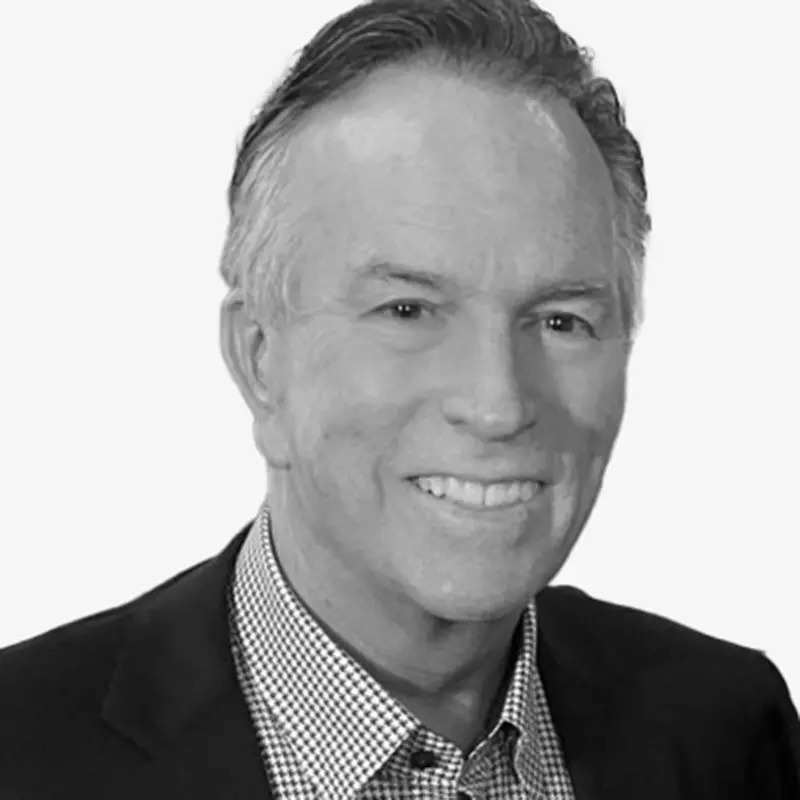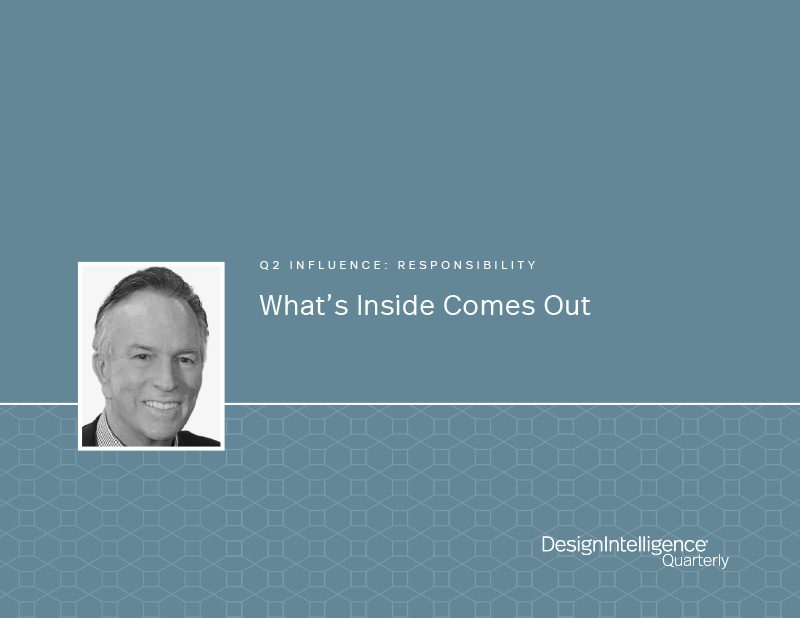What’s Inside Comes Out
by Dave Gilmore
President and CEO, DesignIntelligence
June 29, 2022
Knowledge Is One Thing, Knowing Is Another
A word about our current industry state of being: Busyness is the enemy of effective transformation. We have entered the next chapter of busyness as an industry. Our heads are spinning. Our backlogs are deep. Our talent gaps are keeping us awake at night. Money is flowing, and profits are rising. As a result, many of us fool ourselves into believing we are advancing our professions and industry. Busyness deceives us by convincing us that activity is advancement, that revenue is a metric of success. Truth be told, being busy obscures the procrastinated sins we perpetuate — and perpetrate as an industry. Just as love covers a multitude of sins, perversely, revenue masks a multitude of excuses.
At DesignIntelligence (DI), I repeatedly ask this same question of our organization. Are we truly advancing industry transformation, or are we caught up in the busyness of good-but-non-transformative activity substitutes?
A wise friend and adviser recently provoked me. A large, profitable engagement opportunity presented itself to us that promised to yield a new level of revenue and broaden our footprint. This opportunity would demand tremendous commitment and a large, dedicated team of DI personnel for many months. My friend asked the difficult questions:
- Will this engagement advance the DesignIntelligence agenda to transform the industry away from irresponsibility, waste and self-interest?
- Will it distract from the core mission we’ve given ourselves to these past decades?
He was challenging the idea that more is more. He was counseling us to stay the course, not deviate from the passion that had fueled us to speak regularly to hundreds of thousands of lives. In plain English, the stuff I’m preaching to you is being preached regularly to the mirror.
Over 2,000 years ago, one of the ancients reminded us: “What fills you is what comes out of you.” More recently, a friend shared the story of a group sitting around a table complaining about their working conditions. The conversation was bitter and critical. Thirty minutes in, another who had joined the group’s negativity stood up and slammed her fist on the table. Glasses toppled, spilling drinks across the tabletop. Incredulous, my friend reacted, “Why did you do that? There’s coffee all over the place!” “What’s inside comes out,” the slammer responded and walked away.
“The magic of authentic transformation is found in the filling.”
What’s filling you? More importantly, what are you filling yourself with? Are you filling yourself with hope? Are you pouring optimism and opportunity into your being? Are you funneling the stuff of authentic transformation into your mind? The magic of authentic transformation is found in the filling. The promises of authenticity are only realized when we see our role in life’s greater context and live as transformational agents. This essay’s readership — including you — is made up of the world’s best architecture and design leaders, folks whose preeminent engineering design expertise knows no rivals, educators who are redefining the future of design education and what it means to practice with full awareness, planners and landscape scientists leading the overt attack against inequality, rejection and climate irresponsibility, technologists reshaping our understanding of just about everything, investors funding the future, and countless others of consequential impact. This kind of audience — including you — carries the transformational power I reference. Our challenge: what to do with all we know.
Years ago, I was invited to a gathering of thinkers — leading minds in philosophy, government, economics, ethics and the sciences — to dialogue and debate and search for what was meant by the responsibility of knowledge. We gathered for three days to wrestle with this theme. The famed philosopher Os Guinness threw down the gauntlet, quoting the words of Christ:
“From everyone who has been given much, much will be demanded; and to whom much is entrusted, of them they will ask all the more.”
I was struck by how we participant attendees dodged, bobbed and ducked the responsibilities of the knowledge we had accumulated collectively. Each of us spoke glowingly in turn, presenting the treasures of knowledge, erudition unmatched and blinding brilliance. Yet, somehow, we never landed on the fundamental requirements demanded of each of us from deep in the wells of knowledge we held. On my way home, I was burdened by this thought, struck by my own failure to own responsibility. On that train ride back to Boston, I came to grips with this failure personally and professionally.
Like me, each of you has accumulated much knowledge. In large measure, we are fat and full with knowing. But has our knowledge changed the worlds we live in? Have we altered our proximities by the knowledge we’ve applied? Have we changed who we interact with and how we do so? Have we ascended up the epistemological ladder from knowledge to knowing on our way to understanding?

Epistemological Diagram
The responsibility of knowledge and knowing finds reality only in application. Note the distinction: knowledge vs. knowing. Having knowledge of something doesn’t mean you know it. To know a thing is to be intimate with it and grasp its meaning. We all have massive quantities of knowledge, yet these possessions haven’t translated into meanings and actions that have changed us — or much around us.
Take, for instance, the knowledge we possess regarding global climate conditions. We have been accumulating knowledge about increasing climate debilitation for decades. In 1970, we drove a stake in the ground to establish Earth Day as a response to deteriorating climate. That was fifty-two years ago, and yet we are worse off now than we were then. What have we done with all the knowledge we’ve accumulated? Have we done anything with it?
Because we don’t honestly know the planet or the delicate biosphere on which all living things on Earth depends, we go on assaulting it – to our eventual demise. We have yet to embrace an intimate relationship, a deep knowing, with what it means to be human as but one species of untold millions.
We don’t understand the meaning of “guest,” which is what we are on this beautiful, blue ball spinning in space. Because if we did, if we were in the right relationship with the Earth, we would step back, step down and step aside. We would defer to the ageless laws that govern the planet’s myriad systems.
What examples can you bring forward from your knowledge that are not translating into knowing? What responsibilities are you acknowledging as yours?
The future will transform positively when we take responsibility for what we know and act upon it, because what’s inside comes out.
It’s as straightforward as that.
Dave Gilmore is president and CEO of DesignIntelligence.
Content extracted from a speech delivered at DFC Leadership Summit on Technology & Applied Innovation, La Jolla, CA - May 2022


